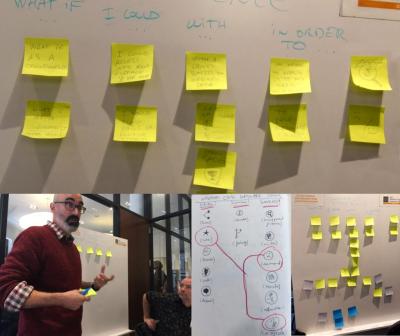
We organized a dynamic session based on a process of modularly building new user stories for platform coops in general, following a process that is often used by agile developers to identify new requirements for software. In our case, this interaction allowed us to document the discussions around different issues from the perspective of the needs and expectations of cooperativism (related to user stories and platform interfaces in general) following the research through design approach.
The results were interesting, although the session did not work exactly as we expected, given that we had intended to brainstorm and generate as many user stories as possible on different types of requirements. Instead, we began with a reflection on which specific functionalities and features (other than those available on existing online platforms and social web interfaces in general), if any, could be explored. It blocked up the session for a while, but after coming up with some missing elements that could help to generate trust in online communities related to cooperatives and unions, we finally arrived at the key element of online reputation systems for every social web application.As we started to specify some basic definitions of a user story for cooperativist-led reputation and feedback systems, some of the examples that had been shared over the previous days at the PlatformCoop conference resonated in the discussion. Examples include the case of crowd-workers not wanting to have their photo on their online profiles, or the other side of online trust systems: when sharing economy platforms are rated by users “outside the platforms”, as on FairCrowdWork Watch; or when users can blacklist unfair requesters on microtask platforms like MTurk via the CrowdWorkers browser extension; or the example of Contratados’ employer and recruiter reviews.
Go to the GEO front page

Add new comment